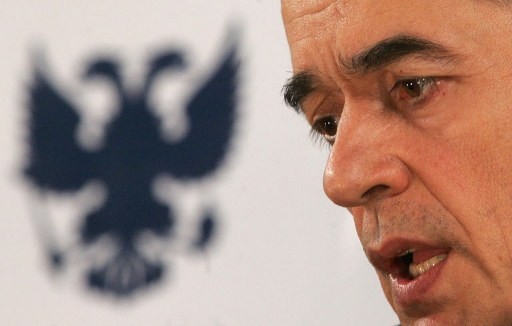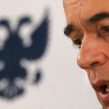
Russia on a Collision Course with the European Union
Publication: Eurasia Daily Monitor Volume: 10 Issue: 181
By:

The Kremlin is demonstrating its growing anger with the European Union for encroaching onto the territory of the former Soviet Union, which Moscow considers its exclusive sphere of influence. An important summit between the EU and the Eastern Partnership countries (Ukraine, Georgia, Armenia, Belarus, Moldova and Azerbaijan) next month in Vilnius, Lithuania, may extend EU association agreements and a free trade zone to Ukraine, Georgia and Moldova—policies the Kremlin believes are aimed at undermining President Vladimir Putin’s efforts to reintegrate the post-Soviet space by forming a Eurasian Union. Russian officials have been threatening Ukraine with dire consequences, if it signs an association and free trade agreement with the EU in Vilnius. In September 2013, Russian customs officials created havoc at trade crossings between Ukraine and Russia by dramatically slowing the clearance of goods and creating long queues of vehicles. Speaking this week (October 8) to journalists at the Asia-Pacific Economic Cooperation (APEC) summit in Indonesia, Putin insisted, “We will be forced to take defensive measures” if Ukraine opens up to the EU, and “this may harm our economic relations.” Putin reiterated, “Ukraine and Russian are, in fact, one nation” and will eventually come together politically, while Russia will continue to help Ukraine despite the EU (https://www.kremlin.ru/transcripts/19382).
Russia has also been putting pressure on Moldova. Last month (September 10), the Russian consumer goods watchdog, Rospotrebnadzor, imposed an embargo on the import of Moldovan wine, citing health risks. This week (October 8), Rospotrebnadzor head and Russia’s chief sanitary inspector since 1996, Gennady Onishchenko, threatened to ban Georgian wine export to Russia. The Kremlin has been regularly using Onishchenko and Rospotrebnadzor to impose arbitrary sanctions and import bans on countries with which Moscow has political disagreements, using sanitary problems as an excuse. Rospotrebnadzor banned Moldovan and Georgian wine in 2006. The ban on wine from Moldova was soon lifted and, at present, one third its wine production goes to Russia. Georgian wine and mineral water were allowed back to Russia only last June as relations with Tbilisi improved after the opposition, led by Prime Minister Bidzina Ivanishvili, won parliamentary elections and came to power in October 2012. Now Tbilisi is seeking an association agreement with the EU instead of joining the Customs Union with Russia, so Onishchenko is back in action (https://www.interfax.ru/print.asp?sec=1448&id=333323).
Russia has accused Lithuania (at present the EU rotating presidency of the Council of Ministers) of harming Gazprom interests and of “actively resisting Putin’s project of building a Eurasian Union, by prompting Eastern Partnership nations to join an association with the EU” (https://www.pravda.ru/economics/rules/globalcooperation/08-10-2013/1177326-litva-0/#). Lithuania has complained to the European Commission about Gazprom using its domination of the natural gas market to charge excessive prices. The Commission, in turn, announced last week that it is close to making a judgment on Gazprom’s gas trading practices in Lithuania and other former Eastern European countries, which may result in multi-million-dollar fines (https://www.kommersant.ru/doc/2311502).
In September, the Russian Federal Customs Service began creating the same havoc on the border with Lithuania as with Ukraine. Last week, Onishchenko announced an embargo on the import of Lithuanian dairy products, citing possible health risks; on Monday, October 7, the suspension of imports was put into effect. A ban of Lithuanian meat and fish has also been threatened. According to Onishchenko, this will not hurt the Russian consumer, since Lithuanian dairy products make up only 1 percent of the Russian internal market, but will punish Lithuania badly (https://www.kommersant.ru/doc/2313743). Onishchenko called Lithuania “a microscopic new formation” or “novoobrazovanye,” which in Russia is a commonly used medical euphemism for a malignant growth. Onishchenko advised the Lithuanian “microscopic malignancy” to mind its own dairy business instead of “using imperial rhetoric to teach Russia” (https://www.interfax.ru/print.asp?sec=1446&id=332545).
This week, Moscow also took on the Netherlands after a Russian diplomat was shortly detained in The Hague by local police, allegedly after some drunken incident. Moscow categorically demanded an apology and Putin, speaking in Indonesia, threatened to “consider further moves.” Eventually the Netherlands did apologize, but it remains to be seen whether this gesture will be enough for Moscow (https://www.interfax.ru/print.asp?sec=1446&id=333702). Russia’s agricultural goods inspection service, Rosselkhoznadzor, meanwhile, has announced that the import of dairy products and flowers from the Netherlands may be banned. Russia imports some $1 billion worth of flowers from the Netherlands a year (https://www.kommersant.ru/doc/2315950/).
Russian sanctions imposed on Lithuania have caused serious problems in the Russian exclave of Kaliningrad, on the Baltic coast. Throughout the whole of the Russian Federation, Lithuanian dairy products may, indeed, make up a small portion of the market, but not in Kaliningrad Oblast, where the embargo has caused public protest. The delay of traffic on the border with Lithuania by the Russian customs service has been hurting Russian commerce and consumers in Kaliningrad (https://www.newsru.com/russia/09oct2013/kenigriot_print.html). This Wednesday (October 9), the governor of Kaliningrad Oblast, Nikolai Tsukanov, pleaded during an audience with Putin to ease the Federal Customs Service’s restrictions, “which are absolutely legal, but cause problems.” According to Tsukanov, “industrial plants are closing and businessmen are complaining that border delays are hampering the movement of cargo out of the oblast” (https://www.kremlin.ru/news/19388).
The next day, the Russian customs service announced that under Putin’s orders it was stopping the havoc on the Lithuania border and returning to work “as usual, beginning October 10.” But the dairy product ban imposed by Onishchenko will continue. The EU Commission has announced it believes Lithuanian dairy products are safe and that the Russian embargo is politically motivated, which seems to be a fair assessment (https://www.kommersant.ru/doc/2315950/). The problems with Lithuania are clearly connected with the coming Vilnius summit, while Moscow sees the incident with its diplomat in The Hague as the Netherlands’ response to the capture of the Greenpeace Arctic Sunrise research icebreaker. The Arctic Sunrise, which was sailing under a Dutch flag, was boarded by the Foreign Security Service special forces (FSB spetsnaz) on September 19, and the Greenpeace vessel’s entire crew has been detained in Russia on charges of piracy (see EDM, October 3).
The cumulative effect of the above series of disputes—the rows with Lithuania and the Netherlands, Russia’s mounting pressure on Ukraine, Moldova and Georgia, the Arctic Sunrise arrests that put behind bars citizens of many European and non-European countries on trumped up charges—seem to be taking Russia and the EU on a collision course. European diplomats in Moscow, speaking to Jamestown on condition of anonymity, say “we are doing our best to maintain good relations with Russia, but the pressure of public opinion at home to respond especially to the Arctic Sunrise arrests is mounting.” The EU Commission may indeed hit Gazprom with hefty fines. And progress on a visa-free travel agreement with the EU, which Russia has been seeking, may once again be postponed (https://www.kommersant.ru/doc/2315950/). Of course, many influential Western politicians and EU bureaucrats have been enjoying mutually beneficial relationships with the Kremlin for many years, but Moscow’s recently acquired rashness is putting these enjoyable ties at risk.




